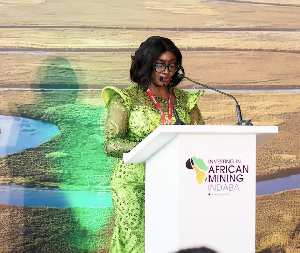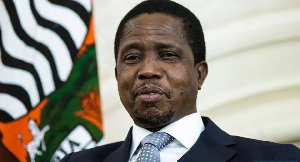In the last few days, the Bank of Ghana (BoG) has been grappling with how to arrest the free fall of the cedi to help redeem the sinking image of the government as presiding over weak fundamentals that are now shamelessly exposing it to the Ghanaian public and the international investor community in particular. Faced with a dangerously low net international reserves (NIR) at a time there is no convincing hope of any inflows in the coming days, the central bank has been honest in admitting that it has so far been unable to support the cedi with a single dollar to help reduce the rate of depreciation. Rather, it has resorted to mind games in managing the deteriorating health of the currency at a time the depreciation is at record levels and the cedi is now ranked as the worst among some 140 currencies globally.
As is already known, the free fall of the currency is largely the result of acute shortage of dollars in the country. That is why in response to the depreciation and in its desperation to arrest the situation and assuage the hardship it is imposing on businesses and ordinary citizens, the Central Bank is now creating an erroneous impression that some $800 million are expected into the national reserves by the close of the first quarter to improve the country’s worsening NIR. In a story published in the Daily Graphic of March 5, the BoG wants us to believe that this will improve liquidity and, therefore, stem the current epileptic fall of the cedi.
What they refused to tell us and deliberately so is what makes this expected $800 million inflows special; where exactly they will come from; the purposes for their coming in and most importantly, how their coming on board will positively impact the reserves and, therefore, the depreciation.
BANK OF GHANA NOT SUPPORTING CEDI WITH $800M
Before I proceed, let me clear some misconception that BoG’s utterances on the claimed expected $800 million addition to the NIR created in the minds of some people. BoG is not going to support the cedi with those reserves, provided even that it gets them and has the right to use them. It is only hoping that their addition to the NIR will help take it afloat the dangerous levels it is now and therefore provide some comfort to the market, the absence of which is currently aiding the depreciation process.
Now, as stated above, the BoG failed to disclose the exact sources of these so-called ‘pipeline’ funds that it hopes will yield an additional $800 million to the national reserves and therefore provide comfort to the international community. Fortunately, my checks reveal three major sources and after knowing about them, one will surely understand why the central bank decided to be mute on the sources of the $800 million additional reserves.
1. The first source of the purported $800 million addition to our reserves is a $300 million swap arrangement that the central bank, faced with the precariously low levels of our reserve position at the moment, is forced to undertake to help boost gross international reserves, not NIR. At this point, let me hasten to state that it is soothing that BoG is acting in ways that vindicate my previous position about the low levels of the NIR and the need to find sustainable ways to shore them up to avoid a run on the country. While the intent is encouraging, the resort to swaps, which is a short term borrowing arrangement, is not the best option and will do little to address the primary problem. In actual fact, proceeds of swaps are encumbered funds. As such, and worsened by the short term nature of those arrangements, they will only increase forex liquidity and impact gross reserves but cannot be counted as part of NIR. Rather, swaps become a cost to the central bank as it will have to pay interest on them. Also, the $300 million must necessarily be available to be returned to the lender on maturity thereby worsening the liquidity and reserve situation and putting pressure on the cedi once again. This returns us to my early advice to the central bank to stop keeping an artificially low policy rate, which is scaring investors away from the bond market – one source of less costly forex. By doing that and now resorting to swaps to shore up the reserves, the central back and the country for that matter is thinking it is avoiding high costs from the fiscal side only to now be paying for it from the monetary side through the interest rates on the swaps it will be paying. Swaps will only provide short term liquidity if BoG decides to use it to intervene in the market. In the current circumstances, BoG appears to want to use it to shore up gross international reserves to give comfort to investors and the market but investors are more worried about the deteriorating NIR cover for short term net private capital flows. This has to be addressed by reversing the alarming portfolio reversals by foreign investors through appropriate interest rate hikes at the fiscal side. For how long can the Central Bank be borrowing to provide liquidity?
2. The second source is a $200 million that is expected to come from an advance payment for cocoa beans that the Ghana Cocoa Board (COCOBOD) will be supplying to domestic cocoa processors. COCOBOD requires the money to finance its operations ahead of the harvest season from which the beans will be gotten and supplied to the relevant institutions. My understanding is that a significant portion of this expected $200 million will be used to procure jute sacks, fertilizers, other chemicals and accessories for spraying cocoa farms. All these are expected to be imported with the dollar proceeds, meaning that the expected $200 million will not have any serious effect on building the NIR contrary to what the central bank will want to us to believe.
3. The third and final source of the purported $800 million inflows into the NIR is a $300 million loan that the Ghana Cocoa Board (COCOBOD) intends to take from foreign lenders to refinance a maturing debt that it has not been able to generate the necessary resources to repay. I am aware that the board is at verge of concluding the necessary paperwork with the relevant institutions for the funds to flow in hence BoG’s excitement. However, unless the original debt of $300 million is owed to a local entity, which will allow the central bank the opportunity to take the dollars and give the cedi equivalent to COCOBOD to pay off its indebtedness, this transaction, like those above will have no impact on the country’s NIR, talk less of arresting the current depreciation. This is because should the original debt of $300 million be owed to a foreign entity, the same amount being sourced from other lenders, in its exact shape and form, will be used to service the debt, leaving nothing for BoG to add to NIR.
From the above, it is clear that although the country, through COCOBOD and BoG will borrow $800 million by the end of March, virtually nothing will be available to shore up NIR as the bank claimed. It is, therefore, erroneous, deceitful and disingenuous for the Central Bank to seek to mislead the market and the general public into believing that some $800 million will be added to NIR by the end of the first quarter.
AS INVESTORS FLEE FROM GOVERNMENT BONDS, DEMAND FOR FOREX INCREASES
While I once again urge BoG to be transparent with their actions and policies, let me state that I perfectly understand the pinhole situation they have found themselves in at the moment hence the desperation to hold on to any available straw. It is interesting to note that the country faces a dire situation in April 2019. We are at a time when our NIR is dangerously low at $3.8 billion when demands on us between now and April ending exceed $1.25 billion.
I am aware that BoG will need more forex to meet the following legitimate transactionary demands for foreign currency;
1. About $500m-$600m of maturing debts held by foreign investors who have already indicated that they will not be reinvesting the monies in Ghana following the alarming trends of fund managers exiting the Government Bond Market,
2. Multinational companies in Ghana such as MTN, Unilever, Nestle and Barclays to mention just a handful will be repatriating profits through dividends abroad from April 2019. This repatriation is estimated at about $200m, minimum and
3. Importers are demanding foreign currency to import and restock their wares ahead of the Easter Festivities. Conservative estimates put this demand between $350m-$450m.
Thus, the country has to find ways to generate in excess of $1.250 billion of forex liquidity between now and end of April to meet forex demand and stem an accelerated decline of the cedi. It is imperative to note that the country got to this stage through wrong policy choices and deliberate and frantic efforts by both BoG and the government to ignore and even treat with disdain alternative opinion/advice.
One source that has traditionally provided the flows of foreign currency to improve liquidity in the market is the participation of foreign investors in the medium-to-long term Government Bonds. Unfortunately, Government’s borrowing program is struggling due to unattractive interest rates. Thus, while Government planned to borrow GHC7.250 billion between January and February 2019 to fund the budget and refinance maturing debts, it only raised GHC3.5 billion. This represents a shortfall of GHC3.75 billion, about 52% under subscription. These numbers paint an alarming slide in investor appetite for Government securities and the potential to generate any meaningful forex liquidity from this source. That is why merely listing traditional sources of export proceeds such as oil, cocoa and gold as the BoG did without specific indication of the amount of foreign exchange flows and the impact on reserves in the near term is grand deception.
Note that at the peak of the external shocks to the economy in 2015, with cocoa, gold and oil prices basically collapsing on the world market, Ghana maintained a NIR of $3.1 billion from just $5 billion of gross international reserves. One, therefore, wonders how come a country with gross reserves of $7 billion currently will have NIR at levels almost equal to the 2015 levels of only $3.2 billion? Our external vulnerability with this size of gross reserves and huge debt service and repayment has heightened precariously.
BOG MUST COMLY WITH ITS OWN LAW
The BoG is proving to be a lawless entity, setting bad examples for corporate governance in the financial sector.
You will recall that by May 2018, BoG was in breach of its obligation to publish its audited financial statements by 31st March. I subsequently drew attention to this breach and it was subsequently rectified.
The Bank of Ghana Act, as amended imposes clear reporting obligations on the central bank to report to Parliament, its activities every six months.
Section 53 provides that ‘The Bank shall hold all foreign exchange of Ghana and submit a report to Parliament on all foreign exchange receipts and payments or transfers of the Bank in and outside Ghana once every six months.
In addition, the Bank, in Section 53 (A) 1, is expected to report as follows;
(a) A report on the conduct of activities in the exercise of the mandate of the Bank under section 4 and;
(b) A report on any other relevant functions being exercised by the Bank under various enactments.
These are far-reaching provisions that require the Bank to report to Parliament on the entirety of its functions for scrutiny and Parliamentary oversight over its activities.
The reports cover the Bank’s activities in respect of the following;
1. Monetary policy
2. Economic developments
3. Management of public debt
4. Advise on fiscal policy
5. Financial stability
6. Money laundering and answering to the blacklisting of Ghana by EU
The law requires the Bank to report to Parliament in respect of the first six months at the end of July and the remaining six months at the end of February of the preceding financial year.
As we speak, we are in March and the BOG is nowhere near Parliament yet Universal banks regulated by BOG are complying with their obligations to report regularly to the Bank of Ghana but BOG cannot comply with its obligations two months after the close of the year.
This is why I enjoin every well-meaning Ghanaian to tell the Bank of Ghana that instead of playing mind games with non-existent $800 million, it should comply with its own obligations to Parliament and answer for its dwindling reserves and the deteriorating health of the cedi.
By Hon Isaac Adongo,
Member of Parliament, Bolgatanga Central,
Member, Finance Committee
Opinions of Friday, 8 March 2019
Columnist: Isaac Adongo
The $800m deceit and Bank of Ghana’s non-compliance with its own law
Entertainment














